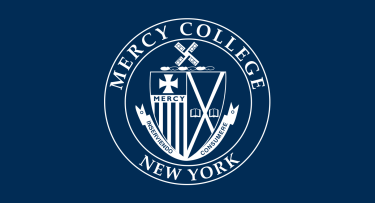New Course in Emotional Intelligence Helps Students Master the Human Side of Business

In March, the undergraduate business honors class in Emotional Intelligence (EI), a new course that launched in January in Mercy’s Organizational Behavior track, sat mesmerized by a lecture given by Phillis Morgan. The highly successful labor and employment lawyer spent three decades working in conflict environments all over the world, including Afghanistan, Uganda and Nepal. Yet in the midst of a brilliant career as a high-powered, respected attorney, Morgan decided to take a leave of absence from her legal practice, traveling to India, Laos and Cambodia, seeking the wisdom of the Dalai Lama, and eventually founding her own company, Resilient At Work. Now Morgan provides training in mindfulness and conflict communication to help companies and individuals address unconscious bias, hostile work environments and other high-stress situations in the workplace.
Mercy professor Chuck Garcia invited Morgan to speak to his class of EI students because “Phillis’s story helps people see that a career doesn’t always have to follow a straight line,” he said. Garcia, who runs an executive coaching business when he is not teaching, said he uses “essentially the same skills and principles that we study in class. I firmly believe that developing emotional intelligence does more to help a person advance their career than any single hard skill, such as being good with numbers or brilliant at selling.”
When Kaleigh Riggs, an honors student and accounting major in the Class of 2021, enrolled in Garcia’s class in January, she was surprised to discover that “my emotional intelligence was actually lower than I thought,” she said. “But along the way, I’ve figured out ways to grow and improve.” She also appreciates Garcia’s teaching style of “pushing you to the edge of your comfort zone. He says that’s where life gets interesting. I’ve learned that you have to put yourself out on a limb to grow as a person.”
Her takeaway from the discussion with Phillis Morgan: “I realized I had been living in my comfort zone, not really trying anything new,” Riggs said. “Phillis made a huge leap from that comfortable place because she wanted to challenge her thinking and develop her underlying skills. That inspired me. Whatever I do in life, I still want to have the courage and faith that I can transfer my skills to something I might be more passionate about, even though I might not be aware of it yet.”
The term “emotional intelligence” was coined in 1990 in a research study published by two psychology professors, John D. Mayer and Peter Salovey. In a later interview in the Harvard Business Review, Mayer defined emotional intelligence as “the ability to accurately perceive your own and others’ emotions; to understand the signals that emotions send about relationships; and to manage your own and others’ emotions.”
Teaching emotional intelligence is a relatively new trend in business schools nationwide, including top schools like Columbia, Harvard and Yale. But as more business school graduates enter the workforce and begin rising through the ranks, they are being called on to recruit, manage and lead. According to Garcia, without an education in emotional intelligence they are inadequately equipped.
“EI is a leadership class,” said Garcia. “It helps students understand human behavior and how to deal with it. You can be brilliant, well-educated, and highly skilled, but that’s only half the story. You have to know how to be human, and how to deal with other humans so you can both achieve your objectives. In my EI class, students gain mastery by discovering their deficiencies and how to improve them.”
While the EI class is new, the concept has been in development at Mercy for a number of years, with Business School Dean Ed Weis as the chief architect. It’s all part of Mercy’s commitment to three central tenets: active learning, both in and outside the classroom; mentoring by successful working professionals; and developing a robust network. “The speakers I invite are very accomplished, and have built wide, deep networks,” said Garcia. “I encourage students to connect with them afterward and begin building a relationship. This is a very important added benefit to the speaker series.”
Riggs agreed, adding that the wide variety of speakers who regularly visit the class deepens and broadens their understanding of the course content. “They say a high IQ will get you the job but a high degree of emotional intelligence will get you the promotion,” she said.
